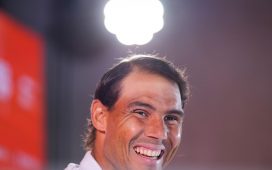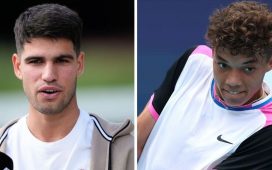As Jo Wilfried Tsonga speaks on the phone shortly after a first round loss in a small ATP tournament in Lyon, he laughs as he thinks of how differently he views the sport he loves now compared to during his youth. Tsonga grew up in Sarthe, a small country village near Le Mans, where life was quiet, simple and “far from the luxury things.” As he rose up the tennis ladder, his success was as much an opportunity to simply see the world beyond those humble confines.
“At the beginning, for me playing tennis was also the possibility to live,” he says. “To be able to pay for a house, an apartment. To eat and do things, other activities.” After so long, though, Tsonga now views tennis through a more inwardly facing lens. “Now it’s completely different because I play for 15 years now on the tour and now I’m playing because I always want to do better. I always want to prove to myself that I’m able to do things on the court.”
This year’s Roland Garros will mark Tsonga’s 12th appearance across 16 years of competing there. For most of his career, the 36-year-old has arrived at his home slam with the clear, unchanging goal of one day winning it all. This time, he will simply be hoping that his body will remain healthy enough to play with some freedom.
After spending all but one week in the top 20 for a decade between 2008 and 2018, a series of serious injuries have led Tsonga to his current, grim ailment. Tsonga now suffers from a chronic back condition stemming from calcified ligaments in his back, which ultimately causes inflammation and other issues.
The injury cost Tsonga 14 months of his career between January 2020 and this March, a period during which he suffered for months and was unable to even carry his son or run alongside him. When he returned this year and won his second match back against the 39-year-old Feliciano López in Marseille, a player he holds a 6-0 record against in a tournament he has won three times, he called the victory one of the biggest wins of his career.
“It was really difficult,” he says. “I didn’t do sports for eight months and, of course, I lost all my physical capacity so [it was a success] to come back and to show a little step forward in my condition. To feel a little better. Because at the beginning I was not even able to play for 20 minutes. I had to go through all this rehab, things that nobody likes.
“For me to win again was already a big challenge because you’re trying to build something for 15 years and, in the end, during eight months without sports you kill everything.”
That is the only time Tsonga has even won a set in the six matches he has played since his return. Even with two months having elapsed since he returned, the injury is still on his mind with every strike of the ball: “When I play, I’m not able to do things like I did before in my career, especially physically,” he says. “I have to change a few things on my movement, on my technique. I have to imagine another Jo, I would say. That’s what is difficult for me also.”

The Jo that first arrived on the tour was, on his day, one of the most glorious sights of the previous decade of men’s tennis. He burst into the top of the sport at the 2008 Australian Open, scuppering Andy Murray in the first round, then bulldozing Rafael Nadal in the semi-final with a godlike performance. He lost to Novak Djokovic in the final and it marked the start of his decade-long stretch in the top 20.
With Tsonga, it is difficult not to think of the sheer joy he plays with on his best days, and the contrasts within his game. His strong, broad frame belies his supreme agility around the court. His huge serve and forehand are complemented with deft hands and innate ability in the forecourt.
His charisma on the court, both during matches and in his trademark celebration with thumbs pointing to the imaginary name on his back, is undeniable. Yet off the court he is quiet and ever so softly spoken. All the while, he remains one of the best black male tennis players to ever do it. The influence and popularity he commands is always clear across the grounds of tournaments.
The greatest obstacle in Tsonga’s career was not really his below-average backhand or return, but rather those who stood before him. His peak coincided with the most dominant years of Roger Federer, Nadal, Djokovic and Murray as a collective. It is often argued that the timing of his career was unfortunate, which he contests: “I think I was fortunate to play with them. For me, it was an honour to play with them. At the end, they will be the best players ever. Four of them, because I consider Andy almost like them.”
“Of course it was not easy to play with them. In all tournaments, I had to play one on one round, and another one the day after, maybe another one the day after and maybe another one in the finals! It was difficult. I did one time in Toronto [in 2014]. When I won Toronto, I beat Andy, Novak and Roger in the row. At the end I was completely sick, completely tired.”
Despite his inability to reach his ultimate goal, Tsonga is arguably the best French male player of the Open era. He may not have Yannick Noah’s Roland Garros title, but his palmares are considerable given the competition: he rose to 5th in the rankings, with a grand slam final, five other semi-finals, nine quarter-finals, 18 titles and one long-awaited Davis Cup victory. Tsonga says that he would always tell himself that his achievements were not enough. Only now does he truly appreciate what he has done.
“When you play, you don’t think at all that you are the best,” he says. “You’re just playing and try to give your best on the court and it’s never enough for a competitor. And I’m part of that. Now I’ve approached the end and, of course, now I’ve realised that what I did was something great, but not more than this. For me, it was incredible. For me. Of course, for people, there’s so many guys like me. So for people it’s normal. For me, it’s a miracle. A miracle.”
In reality, there are very few like Tsonga, in terms of where he has come from – the son of a Congolese handball player who travelled to France to study – and all that he has brought to tennis with his talent and achievements. It remains to be seen how much further his body will allow him to go, but it is admirable that he is here to do all he can in service of those remaining goals. “I have to imagine another way to play, to win, and at the moment it’s not easy,” he says. “I will continue to see how it goes and if it goes well, I would be happy to compete again and win. And if not, it’s going to be the end of a nice adventure.”








